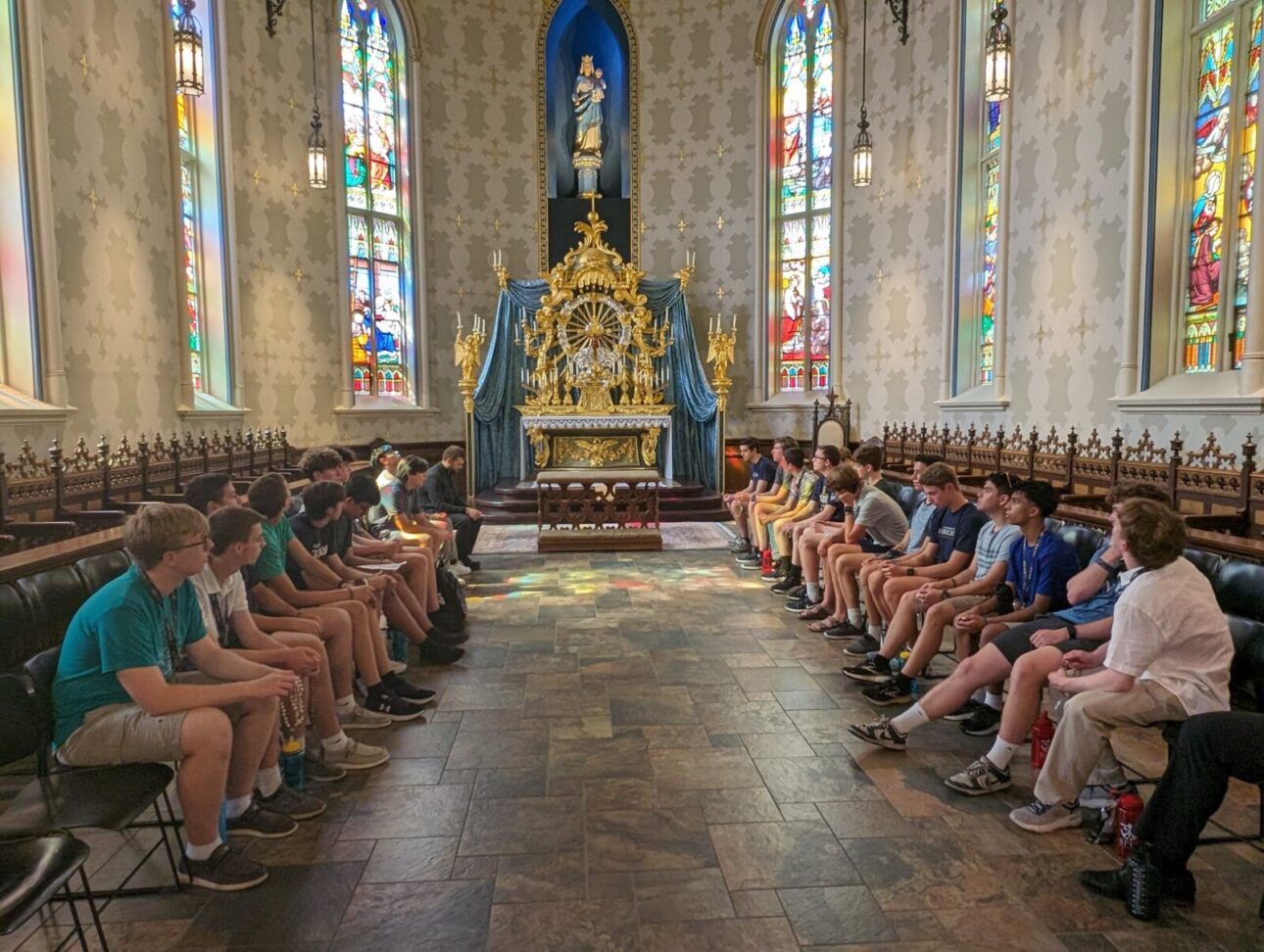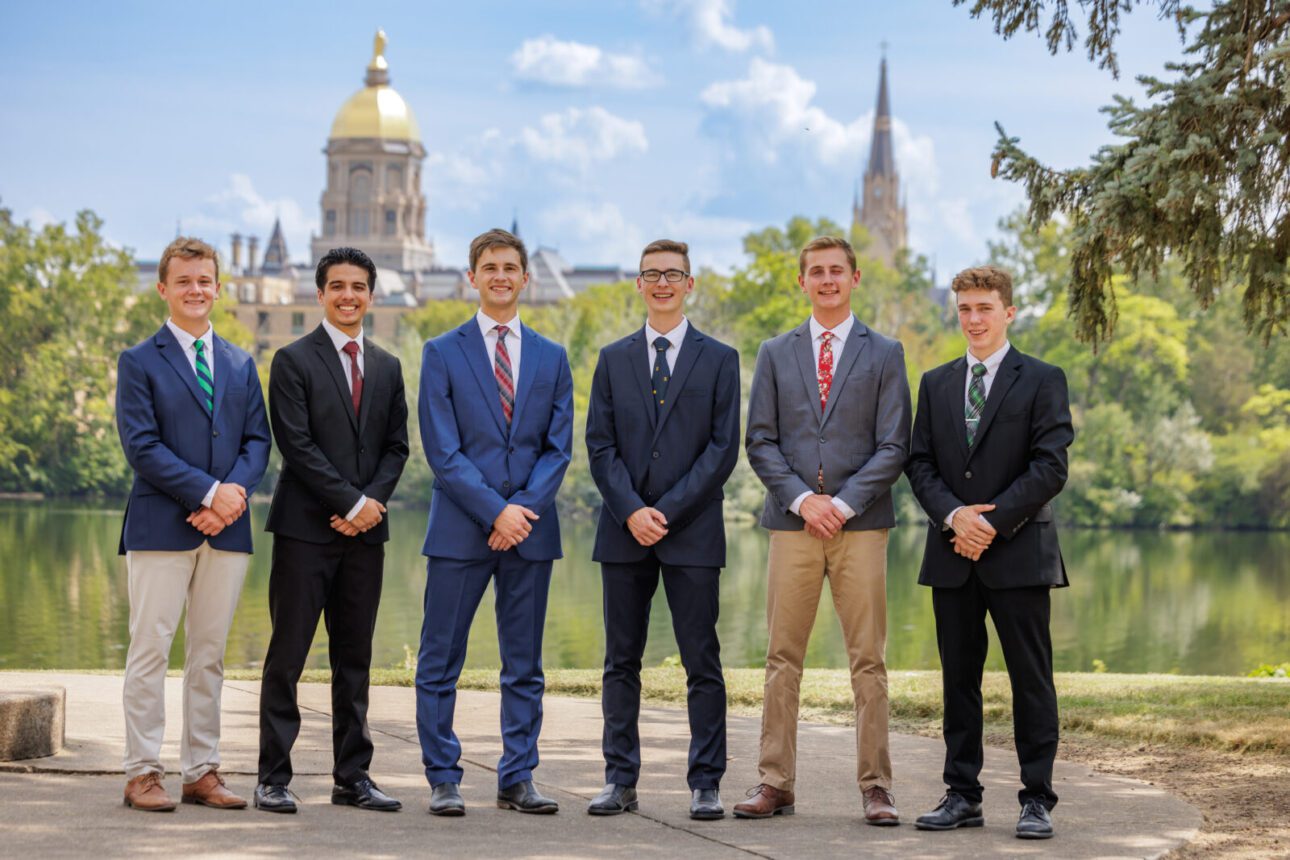Are You Called?
Get advice on discernment and learn more about discernment opportunities throughout the year hosted by the Congregation of Holy Cross.
Are you called?
This is the question that brings you here.
This is the question that won’t let you go.
Finding the answer requires you to open your heart and dive into the work of discovering Christ’s call. It is work that is well worth your while. The Congregation of Holy Cross offers resources to assist you in your discernment.
“We had been washed in baptism and confirmed in our belief and given the eucharistic nourishment in memory of Him. But there seemed to come a time when the Lord was calling us to take some further step.”
Constitutions of the Congregation of Holy Cross, 1:2
Discernment Tips
Learn to Hear the Call
In Scripture, we find many stories wherein God’s call was made manifest through some spectacular event, like a burning bush, an angelic messenger, or Christ Himself standing on the seashore. The reality is that our call will likely come in a much more subtle manner. Coming to an understanding of our call is a matter of discernment. It is a prayerful handling of the manifestations of God’s will that come to us through our skills and abilities, our hearts’ desires, the circumstances of our lives, and the encouragement of others. There is no set program that will lead us through discernment to a definitive answer. And yet there are steps that we can take.
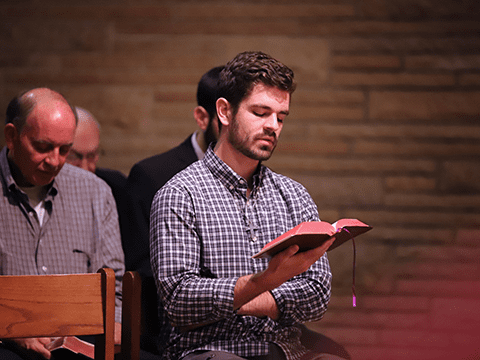
1. Prepare Your Heart
Throughout our lives, the Lord stirs our hearts to reveal his holy will for us. A key component to any Christian discernment is to attend to the heart, yet first the heart must be prepared to recognize the Holy Spirit’s movements and promptings. Before you ask God what he wants you to do with your life, you need to come to know him personally. The sacraments, prayer, and service are a few of the many ways you can grow in your relationship with God and become a true disciple of Christ. As you clear away obstacles and fears, avoiding temptations and sins and growing in virtue, you will become free to hear and respond to God’s call. You will truly be able to pray, “Your will, not my own.”
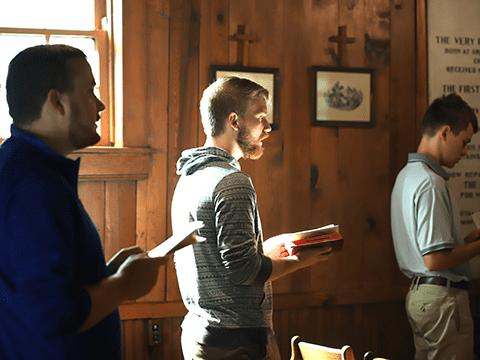
2. Ask the Question
Often we desire to know God’s will for us, but we forget to slow down long enough to ask the question or even consider what the question is. Discernment requires that we be deliberate about the questions we ask and how we ask them. When asking God for wisdom regarding your vocation, first ask for the desire for the answer. While knowing God’s will may seem desirable, often when it is revealed, it is intimidating or unsettling. That said, God rarely gives a complete vision of what the rest of your life will look like. More often, he shows the next step and invites us to take it. The question to ask is not if God is calling you to be a religious or priest, but rather if God is calling you to enter formation. When you do ask that question, focus on and pray about one path at a time. It is hard enough to hear God say yes to a single question, let alone to hear his response to a multiple-choice question.
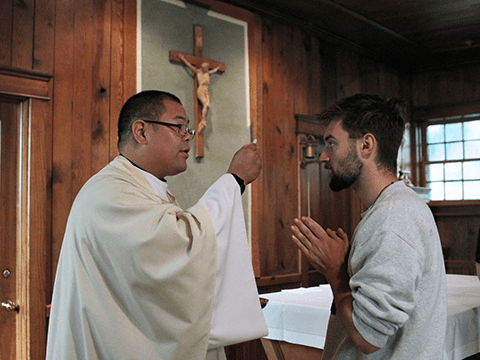
3. Listen for God's Call
God’s response to our questions is not always quick or obvious, yet he always makes his will known to those who seek it with sincere hearts. As you wait for an answer, have faith and trust. God’s call is not a game of hide-and-seek. God wants to reveal your vocation to you, and in his time he will do so in a recognizable way. Be willing to be silent in prayer, allowing your heart to rest in God. If possible, do so in the presence of the Blessed Sacrament. Give him time to work on your heart and direct it according to his will. Instead of seeking certainty, look for joy and peace. Joy is the most infallible sign of the presence of God, and our vocations will involve a deep sense of peace and fulfillment. God can also use other people to help us hear his call. Often others can see abilities and possibilities in us that we do not see. A reliable indicator of God’s call is when advice and insights from your friends, family, and mentors in faith begin to align with the movements of your heart.
“The disciples followed the Lord Jesus in His ministry of proclaiming the kingdom and healing the afflicted. Jesus also spent long days alone with His disciples, speaking to them of the mysteries of His kingdom and forming them to the point when they too could be sent on His mission.”
Constitutions of the Congregation of Holy Cross, 6:56
The Voice of Christ
“What might be the joy in store for you as you follow the deepest desire of your heart: the voice of Christ?”
Listen to Fr. Lou DelFra, C.S.C. as he reflects on the Apostle Peter’s life and story of discernment.
Discernment Aids
Prepare to Hear the Call
The work of discernment cannot be broken down into a set program that will guarantee results. But there are tried and true aids to discernment that will draw us closer to God and assist in opening our hearts that we may know and desire God’s will.
Sacraments
The Sacraments are concrete moments where we encounter God’s grace. The more that we enter into these moments, the more this grace permeates our life and can then draw us into closer communion with the Lord. The Eucharist is the source and summit of our life in Christ; thus it is imperative that we attend Mass every Sunday. Frequent participation in daily Mass greatly assists our growth in God’s grace. Also important is regular confession. Through the Sacrament of Reconciliation, we receive the grace that frees us from the sin that becomes an obstacle to hearing and following God’s call.
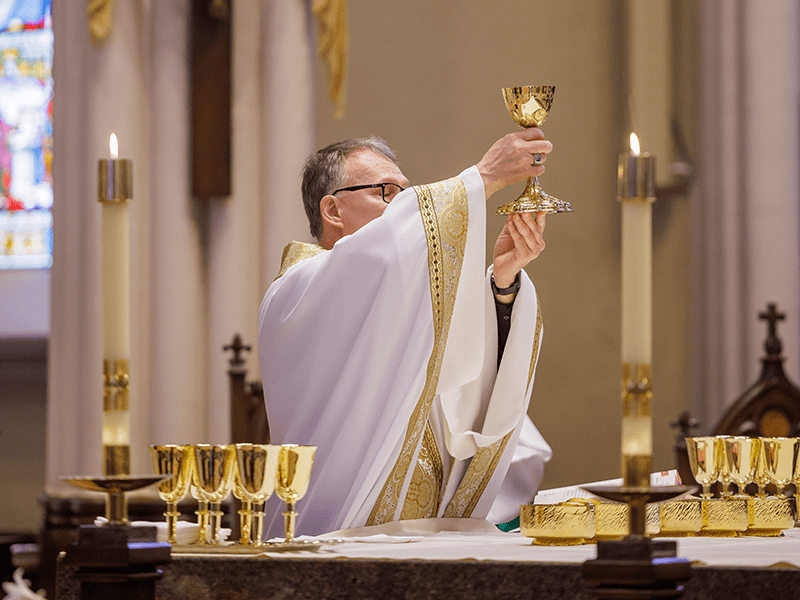
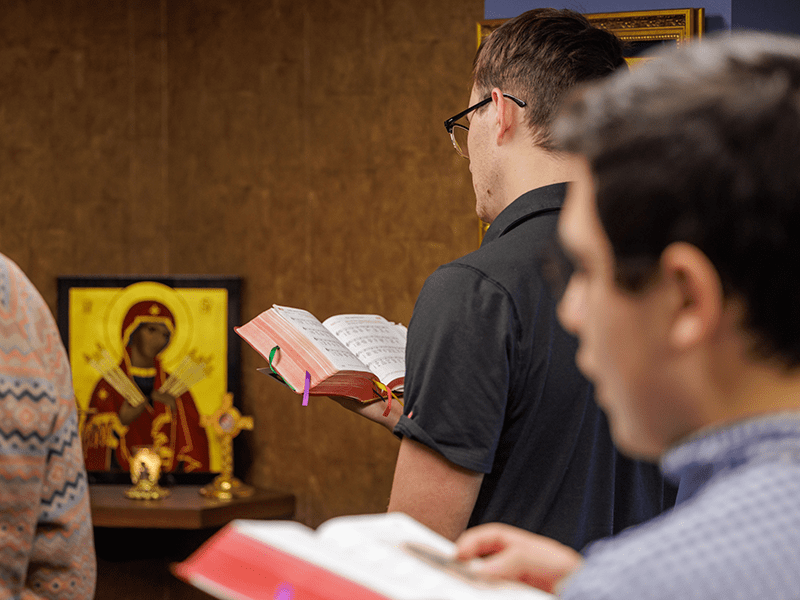
Prayer
Through time spent in prayer, we encounter God and allow him to work in our hearts and make his will known. Dedicating time every day to the Lord, even a few minutes, is an essential investment in our relationship with him and our ability to know and follow his will. Several forms of prayer that are particularly helpful in discernment are:
- Praying with Scripture
- Praying with the Blessed Virgin Mary
- Praying with the Eucharist
- Praying for your Vocation
If you are drawn to a vocation in Holy Cross, you might also reflect on the Holy Cross Constitutions.
Conversation
Often, those in discernment keep their thoughts to themselves, afraid to let anyone else know they are considering a vocation. Yet this approach isolates them from an important aid to discernment. Often, those who know us well or those who have been through the process of discernment can provide valuable insights that can help. If a vocation to the priesthood or religious life has been on your mind for a while, talk about it with someone you trust. It is also helpful to bring your vocation discernment to a priest, brother, or a vocation director. A good vocation director does not expect everyone he talks with to enter the seminary; rather, he helps you come to a deeper understanding of God’s call.
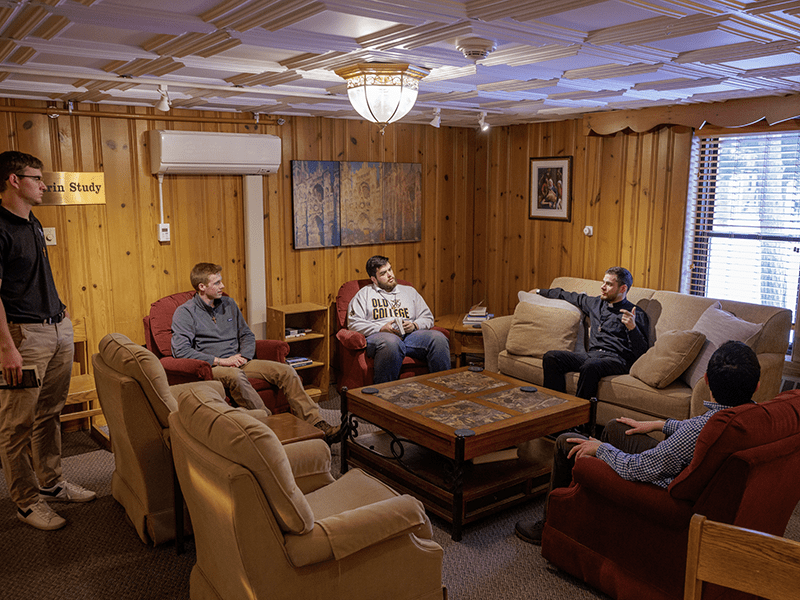
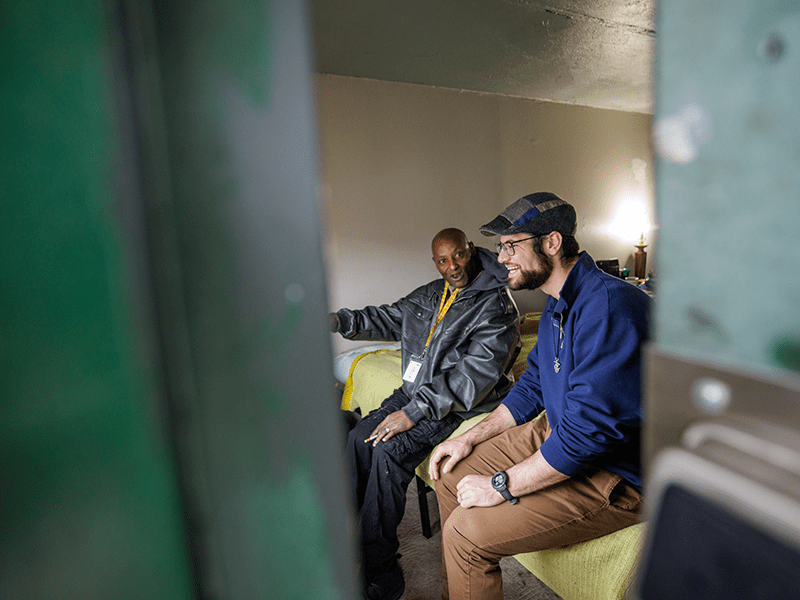
Service
A reliable indicator as to whether you are called to a religious or priestly vocation is that you find energy and joy in serving others. Seek ways to offer some of your time in service. Through this, you will gain insight into whether you can offer your whole life in such service. Many find it helpful to become involved in liturgical ministries such as lector or altar server; in teaching ministries such as RCIA or Religious Education; and in direct service to the poor. It is also helpful to seek out opportunities for leadership, as a vocation to the priesthood and religious life will require an ability to organize and lead others. Through service and leadership, you can develop your abilities, grow in an understanding of your gifts, and develop a greater understanding of how God is calling you to serve the Church.
Visit
Visiting a seminary program or religious house gives a real and concrete experience of what it is like to take a step in that direction. There is a good bit of discernment that happens in prayer, contemplation, and conversation. Yet this can only take you so far. To know if you are called to enter a seminary or religious community, you have to visit. Visiting a seminary is an opportunity to meet the people and to see what the rhythm of life is like. Often such a visit can dispel misconceptions and give you an idea of whether it is the right next step for you. Opportunities to visit Holy Cross are offered through scheduled retreat programs or by scheduling an individual visit through the Office of Vocations.
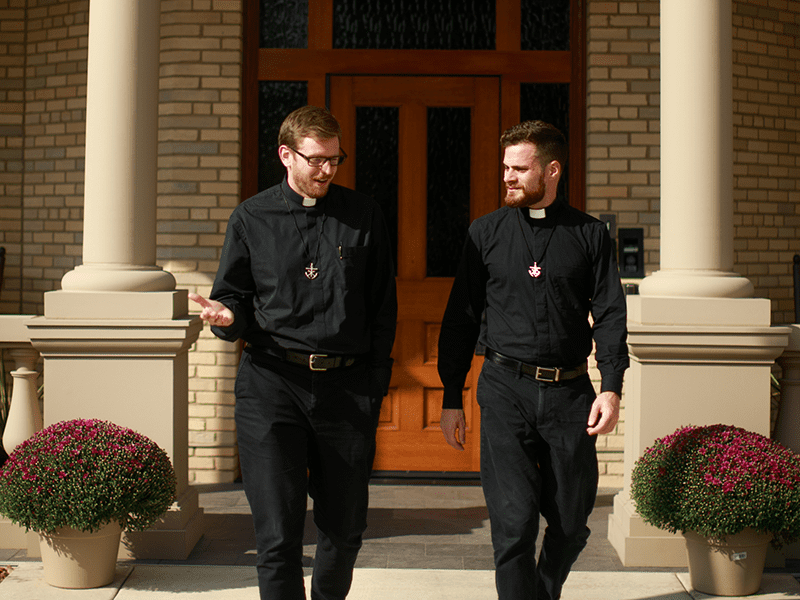
“Our thoughts are not easily God’s thoughts, nor our wills His will. But as we listen to Him and converse with Him, our minds will be given to understand Him and His designs. The more we come through prayer to relish what is right, the better we shall work in our mission for the realization of the kingdom.”
Constitutions of the Congregation of Holy Cross, 3:21
Reflections for Discernment
Reflect on the Call
Discerning your vocation is a matter of reflecting on God’s call and considering how you are being led to answer that call. There are several tools for discernment and several ways to attend to it. A helpful method of discernment is to spend some time with questions that lead you deeper into the consideration of your vocation. Often, we know that the Spirit is at work in our hearts, but don’t give it the time it deserves. Or, if we are willing to spend time with it, we are not sure how. Below are several questions to aid your reflection on your life and your calling. Writing out your thoughts on these questions or discussing them with either your spiritual director or a vocation director can be helpful.
My Current State
Before you can consider where you are going, it is good to start reflecting on where you are now.
Why are these questions preoccupying me?
What are the resources that can assist me in finding answers to my questions?
Who are some of the people I can turn to and talk with?
Are there pressing matters that I need to attend to before I can get to the deeper questions of my vocation?
My Relationship with Jesus
As Jesus’ disciple, your vocation is wrapped up in your relationship with Christ.
How would I currently describe my relationship with Jesus?
What are the things that have drawn me closer to Jesus and helped me know him more?
What are the things that have drawn me away from Jesus?
What is my prayer life like, including the celebration of the Sacraments and the reading of Scripture?
How closely is the desire of my heart aligned with Jesus’ desire for me?
What might I do to know Jesus more, grow closer to him, and unite my will and desire with his?
My Vocation Discernment
Before asking specific questions about the priesthood and religious life, it is helpful to first consider the bigger picture.
What are some of the options that I am considering?
What do my skills, abilities and interests point to?
What do other people encourage me to do?
Are there any thoughts on my vocation that will not go away?
Do I connect my consideration of my future with God’s call for me?
Do I truly want to know what God has in store for me? Have I asked him?
Am I willing to follow God’s call if it is made clear to me?
My Discernment of Religious Life and Priesthood
Spend some time specifically focused on a possible call to religious life and priesthood.
What events/moments have prompted me to think about a vocation to the priesthood and religious life?
When did I first start thinking about a vocation to the priesthood and religious life?
What are the times and places in which these thoughts surface?
How have I reacted to these thoughts?
What attracts me to the vocations of priesthood and religious life?
How have those thoughts or attractions changed over time?
Who are priests and brothers that I look up to? Why do I admire them?
My Obstacles and Fears
Before you can move forward in your discernment, it is important to consider the things that may be holding you back.
What are the obstacles external to me (such as debt, familial obligations, etc.) that keep me from being free to hear God’s call?
What anxieties and fears internal to me (such as loneliness, unworthiness, uncertainty) prevent me from freely asking God what his will is for me?
What are the sources of my fears?
How can I begin to address and overcome my fears?
My Past Discernment
As you consider how to move forward in your vocation, it is helpful to look back at how you have made decisions in the past.
How do I usually make decisions?
What has helped me to move forward and make decisions?
How have I avoided making decisions or delayed making decisions?
How would I characterize my discernment up until today?
In what ways have I sought the Lord’s input, particularly through prayer?
What have I been listening for or waiting for in my prayer?
What input and resources have I sought and utilized in my discernment?
My Current Discernment
Considering what has worked in the past, look forward to how you might move ahead in your discernment.
How have you made decisions in the past?
What has worked well in your past experiences? What has not worked well?
Are there other lessons learned from your past decisions that you can apply to your current discernment?
How might I bring questions to God or listen to him differently?
What is the next step that I need to take in my discernment?
What questions do I still have about how to go forward in my discernment?
How will I seek to address those questions?
Whom can I speak with to help me in my discernment?
What concrete steps can I commit to? (Daily Mass, regular meditative prayer, service)
My Understanding of Seminary
Spend some time reflecting on your understanding of the seminary, what you know and what you don’t know. Consider how you might learn more or explore whether you have a vocation to the priesthood.
What is my understanding of life in the seminary?
How do I know if it is accurate?
How can I gain a better sense of what life will look like in the seminary?
What attracts me to the priesthood?
What indicators have there been that I may have a vocation to the priesthood?
What is my understanding of the priesthood?
My Understanding of Religious Life & Holy Cross
Spend some time considering your understanding of religious life in Holy Cross.
What is my understanding of religious life?
How do I know if it is accurate?
What do I know about the Congregation of Holy Cross?
What questions do I still have about Holy Cross?
What attracts me to religious priesthood vs. diocesan priesthood?
What attracts me to Holy Cross?
What would I envision myself doing as a priest and religious within Holy Cross?
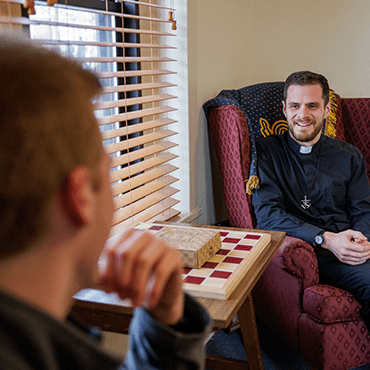
Contact a Vocations Director
Have Questions about Discernment?
After you have spent some time reflecting on your vocation, you may have further questions about discernment, the religious life, the priesthood, or Holy Cross. Often, the best way to address these questions is through a conversation with a vocation director.
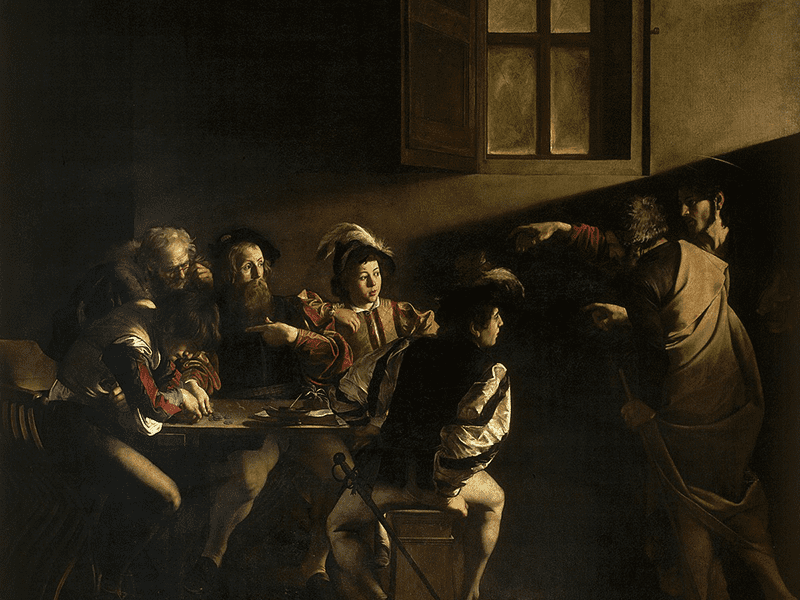
Make a Visit
Explore Discernment Opportunities
Before calling them to leave all things behind and follow him, Jesus invited his disciples to “come and see.” He knew that if his disciples were going to be able to make this leap of faith, they needed to separate themselves from their daily routines. Only then could they come to know him more and experience the life and mission to which he was calling them.
To help you discern if Jesus is calling you to follow him as a priest or brother in the Congregation of Holy Cross, we invite you to “come and see.” We offer events and weekend retreats for high school juniors and seniors, college students, and college graduates discerning a call to religious life and priesthood.
FAQs
Curious about Life in Holy Cross?
If you want to learn more about vocation discernment and life in Holy Cross but aren’t yet ready to contact a vocations director, read through our FAQs to learn more about discernment, the application process, religious vows, and much more.

